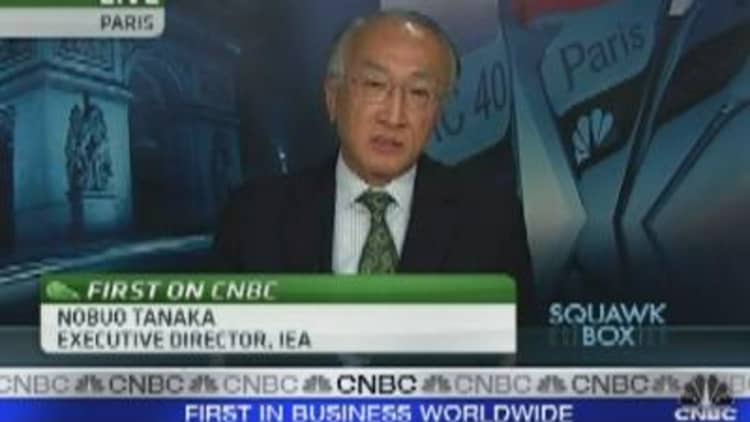The International Energy Agency is ready to release more oil onto the market if necessary, Nobuo Tanaka, Executive Director of the agency, told CNBC in a first on CNBC interview Friday morning.
“We are ready to act at any time and if we have to we will continue,” Tanaka said. He added that the watchdog “sometimes had to bite”.
On Thursday, the IEA announced the surprise release of 60 million barrels of oil from the strategic petroleum reserves of 28 nations. The statement sent shockwaves through global markets and sent oil prices down to around $91 per barrel, their lowest level since February.
“The only test of the right oil price is whether we can maintain the level of the global economic recovery. At the same time, we want to maintain investment level and exploration,” Tanaka added.
“We are convinced the market is getting tighter so if we don’t loosen up we could see a much more difficult situation and a hard landing for the economy,” he added.
The decision to release 60 million barrels of oil followed market disruption prompted by trouble in the Middle East and divisions in the OPEC countries over whether to raise production. The agency also wanted to stave off a possible spike in energy prices. The IEA believes that the crisis in Libya had removed 132 million barrels of oil from the market by the end of May, and predicts that Libyan oil will mainly remain off the market until the end of the year.
It was just the third time in the agency’s history that its members released some of their more than four billion barrels of stocks. The United States will provide half, Europe 30 percent and members in Pacific Ocean the remaining 20 percent.
The two previous releases of oil came during the Gulf War and shortly after Hurricane Katrina.
While 60 million barrels only represents around 17 hours of global consumption, the market was spooked on Thursday.

The Paris-based agency warned that the release was in response to an "imminent threat of shortfall," which could threaten the global economic recovery.
In 2008, following the credit crisis, oil spiked suddenly, which helped fuel a global increase in food prices.
He did not give a specific level for what the oil price should be but said that the IEA wants "to see the market really supplied well" so that the price supports the recovery.
"We are not predicting good prices or right prices… the only test of the right price or not is, can we maintain the global recovery?" Tanaka added.
He said that the turmoil in Libya, which has reduced the number of barrels of oil coming into the marketplace, but also Japan 's economic situation, were continuing to affect the market.
"As the consumer countries, this is a very strong way to show your commitment to a stabilized market," he said.
Some OPEC members warned on Thursday that they could retaliate against the IEA's actions by tightening supply.
"Within OPEC, there are differences of opinion, and some of the countries don't have any spare capacity. We're trying to work together and make this market stabilize," Tanaka said.
He added that the measures were "just short term" and said oil prices are likely to go up again in the longer term.
"Certainly in the longer term the price could be higher… globally we must be more efficient," Tanaka said.
"The IEA may be tempted to extend the draw for an additional 30 days, but at some point we expect that fundamentally tighter markets will force the IEA to surrender to higher prices," analysts at Deutsche Bank wrote in a note.
“For the time being there is a major switch in the oil balance of power,” said Neil Atkinson, director of energy research and analysis at Datamonitor.
“The IEA decision is clearly based on political pressure led by the United States. The Obama administration is terrified of $4 gasoline in 2012 when voters go to the polls. OPEC’s inability to reach a decision two weeks ago in Vienna – any decision – is now rebounding terribly on them as they have lost credibility as a price regulating authority,” he added.


